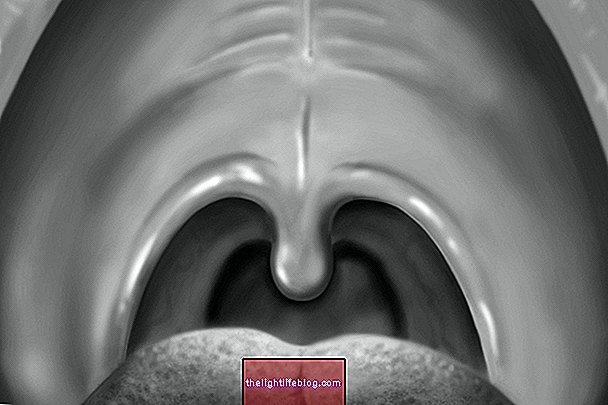Tonsillitis corresponds to the inflammation of the tonsils, which are lymph nodes present in the fundus of the gargante and whose function is to defend the organism against bacterial and viral infections.
According to the cause and duration of symptoms, tonsillitis can be classified into:
- Bacterial tonsillitis, which is usually caused by Streptococcus and Pneumococcus bacteria - learn more about bacterial tonsillitis;
- Viral tonsillitis, which is usually caused by the Epstein-barr virus , which is the causative agent of mononucleosis, cytomegalovirus, parotid virus and adenovirus, which corresponds to a group of viruses that normally cause respiratory diseases;
- Acute tonsillitis, in which the infection lasts up to 3 months;
- Chronic tonsillitis, in which the infection lasts more than 3 months or is recurrent.
Tonsillitis causes symptoms such as sore throat, difficulty swallowing and fever, and treatment should be done with the advice of the doctor, and usually the use of medications is indicated, although home remedies such as gargling with salt water, for example, may have the same effect.

How to identify
Tonsillitis can be identified from the following symptoms:
- Sore throat lasting more than 2 days;
- Difficulty swallowing;
- Red and swollen throat;
- Fever and chills;
- Irritative dry cough;
- Loss of appetite;
- Unwell.
In addition, the presence of white spots in the throat may be perceived as being indicative of pus. Learn how to get pus out of your throat.
Tonsillitis is contagious?
Tonsillitis is contagious, especially when it comes to viral tonsillitis. Therefore, to avoid transmission of the disease, it is advised:
- Always cough with a tissue in your mouth or put your forearm in front of your mouth when you cough;
- Wash hands thoroughly;
- Do not share towels, dishes, glasses and cutlery, for example.
The transmission of tonsillitis occurs through direct contact with saliva droplets of the infected person, especially when the person's health is weakened as occurs in the case of the baby and the elderly, and therefore they must keep distances from those contaminated.

Main causes
The causes of tonsillitis are related to the presence of viruses or bacteria in the region, especially when the person has the compromised defense system.
For the diagnosis of tonsillitis, the doctor can observe the person's throat, palpate the neck and, if necessary, request blood tests and scraping the tonsil tissue to identify the micro-organism that causes the infection.
How is the treatment done?
Treatment for tonsillitis can be done with antibiotics derived from Penicillin in the case of inflammation caused by bacteria and medicines to control fever and pain if tonsillitis is of viral origin. The illness lasts on average 3 days, but it is common for the doctor to indicate the use of antibiotics for 5 or 7 days to ensure the elimination of the bacteria from the body.
Drinking plenty of water, increasing the consumption of foods rich in vitamin C and giving preference to the consumption of liquid or pasty foods also helps to better control the disease.
Removal of the tonsils is indicated in case of recurrent tonsillitis. Learn more details of the treatment for tonsillitis.
Home treatment for tonsillitis
A good home treatment for tonsillitis is to gargle with warm salt water 2 times a day, as the salt is antibacterial and may aid in the clinical treatment of the disease. Check out some home remedies for tonsillitis.

























